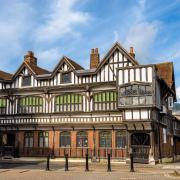There are various counties that could lay claim to H.G. Wells. There’s Kent (he was born in Bromley and lived in Sandgate) and Surrey has a shout as he lived there when he envisioned ‘The War of the Worlds’, hence Woking getting knocked about by the Martians. But we also have bragging rights in Hampshire for three of his novels were inspired by his time in Southsea.
Wells came to Southsea in 1880 to embark on an unhappy apprenticeship at Hyde’s Drapery Emporium at 9 Kings Road, on the corner of St Paul’s Road. He was there until 1883 so was aged around 14-17-years-old.
Sleeping in a basement dorm with other apprentices, then working 13-hour days commencing with a curt awakening at 7am and continuing with endless tedium was not what Wells wanted, and that miserable life of a draper’s apprentice was characterised in The Wheels of Chance, The History of Mr Polly and Kipps, a trio of novels inspired by his time in Southsea.

Having failed to make the grade as a draper, and also bombing as a chemist’s assistant, Wells ended up in Sussex, ensconced in the rather more salubrious surroundings of Uppark, where his mother resumed work as a lady’s maid.
Wells, of lower middle-class parentage, tried his hand at teaching, but then found his true vocation in journalism and then literature. In his authoring he’d be an ideas man of the early 20th century and due to his popularity, could disseminate these ideas among the populace at large.
Although he’s most famous for full-length works, some of Wells’ short stories are compelling, including Country of the Blind (1911) and Collected Short Stories (1927) which includes some of his best writing. He’s famous though for The Time Machine (1895), War of the Worlds (1898) and The Shape of Things to Come (1933) where he indulged his overactive imagination. The phrase time machine belongs to Wells incidentally; he coined it.
Returning to his Southsea years, it was Wells’ early novels where he acts as self-appointed spokesman for the downtrodden urban worker. If Thomas Hardy was a voice of rural England, or at least the rural South West, Wells became a foghorn for those battling harsh inequity in towns and cities.

It was his frustrating years on the southern side of Portsmouth that inspired some of his most memorable characters such as Mr Kipps, Mr Polly and Bert Smallways, the latter’s name a metaphor for the small man downtrodden by exploitation. Wells tapped into his Hampshire experience to conjure up a winning formula, the downtrodden ‘little man’, pathetic and pitiable on the one hand, yet never defeated, so also ‘sturdy, comic and heroic’. The character has endured, the unfancied man in the crowd who persists to break out; perhaps he was truly born in Southsea.
Mr. Hoopdriver, the hero of The Wheels of Chance (1895), is a frustrated draper’s assistant, who utilises his annual leave on a cycling tour of the Home Counties including visits to Havant, Botley and Ringwood. A chance encounter resolves him to try and better himself and improve his standing in life. Kipps: The Story of a Simple Soul (1905) was reputedly Wells’ favourite among his own works and the one inspiring the musical Half a Sixpence. Although he wrote over 100 books it’s undoubtedly one of his best, sometimes dubbed ‘the first modern novel’.
Arthur (Artie) Kipps is an illegitimate orphan who’s apprenticed to a drapery bazaar aged 14. Kipps is dismissed from his work but then secures an inheritance which leads to immense prospects but brings difficulties ‘fitting in’ with a new social standing. Ultimately Kipps is reduced in circumstance but achieves contentment as a shopkeeper in a modest coastal town.

Bert Smallways is the principal character in The War in the Air (1908), an ‘unimpressive and unsuccessful’ type who nevertheless goes on to achieve in the setting of war and by the end of it is ‘doing very well’.
The History of Mr Polly (1910) centres around Alfred Polly, an anti-hero character inspired by those early experiences of the drapery business. Polly hates his job, as did Wells, is devoid of direction, yet ultimately achieves some victories which leave him content, which is all most of us can hope for.
They are all tales of the small man overcoming life’s vicissitudes to achieve some form of contentment. The Southsea years made another important contribution. It was then he observed the detailed grind of everyday life. What makes a book like ‘War of the Worlds’ so effective is its familiar setting among the ordinary and recognisable, the things we know, only to have this suddenly and literally invaded by something frightening, disturbing, and alien.
Wells resembled another writer with Portsmouth connections, Charles Dickens, in being a social writer. Some of his novels tackled contemporary social issues including Ann Veronica (1909), Tono-Bungay (1909) and Marriage (1912), novels that shifted public opinion. Again, possibly because of the relative misery he’d endured when younger in Hampshire, Wells believed in a Utopian society where not just a fortunate minority would prosper. He believed the new Millennium (20th century) was commencing with science, and its advancement, in its favour, hence The Work, Wealth and Happiness of Mankind (1932). He wasn’t a total fantasist though and understood science could also work against mankind, a realisation rendering him pessimistic about our future. He would have been interested in today’s debate about A.I. et al.

Although Wells is mostly remembered for fiction, his knowledge compendiums are stupendous achievements, namely The Outline of History (1920) and Science of Life (1929-30) which were written with his son and Julian Huxley. Not everyone was a fan. When Virginia Woolf came along, Wells was one of the writers she ‘dissed’ but then she was a representative of the Bloomsbury Group intelligentsia; Wells wrote for the masses. I know who I prefer.
To be fair to Wells he could be a critic too. He wasn’t a fan of Henry James, for example, an author noted for being ‘wordy’ (they were supposed to be mates too). On a lighter note, Wells liked his cricket and played for what was probably the first celebrity cricket team founded by Peter Pan creator J.M. Barrie. Another fixture in a side of literary luminaries was Sir Arthur Conan Doyle who also had connections with Southsea.
Wells’ autobiographical tome Experiment with Autobiography (1934) reflects on the miserable, yet influential time spent in Southsea. He died on August 13, 1946 aged 81.



























